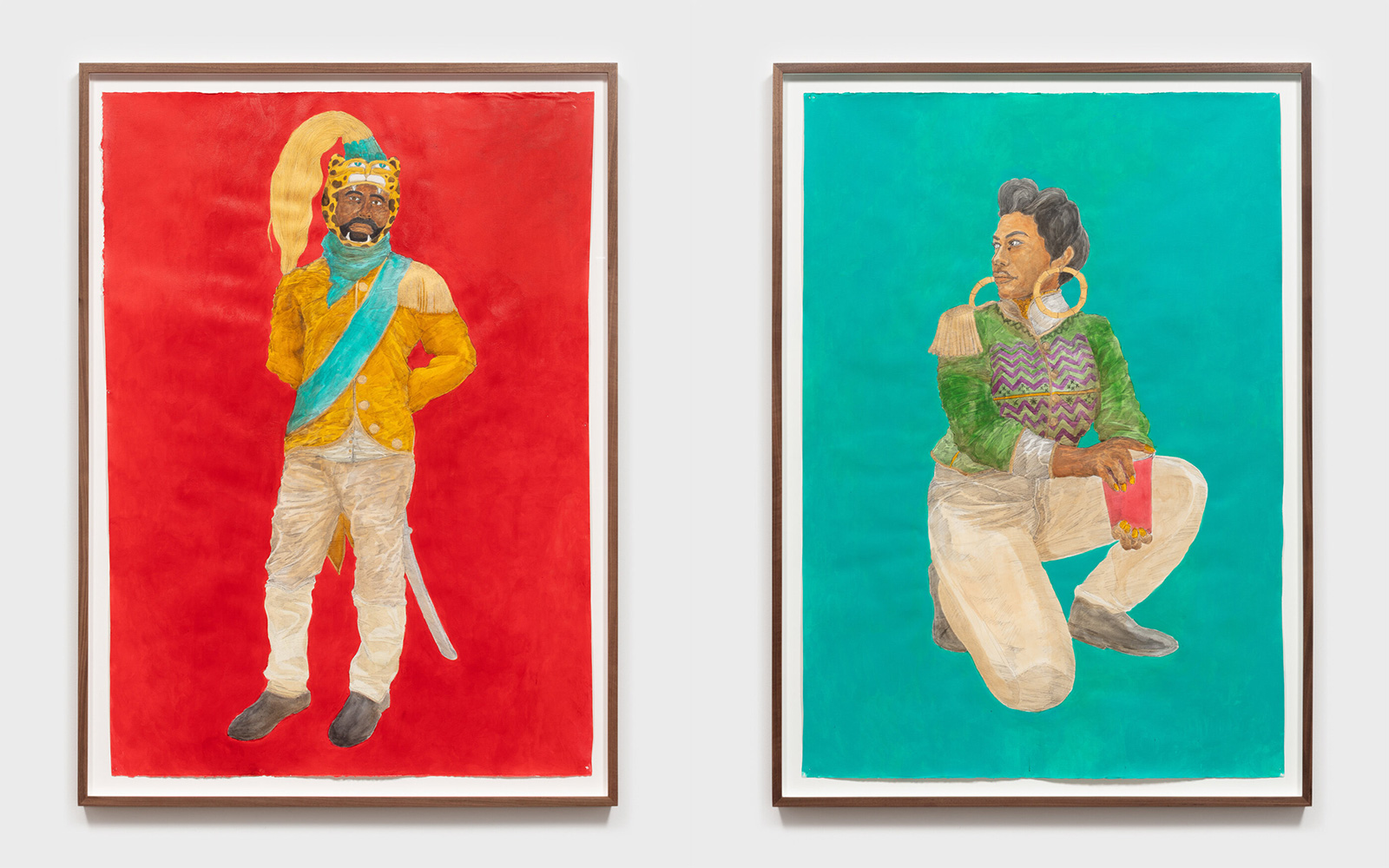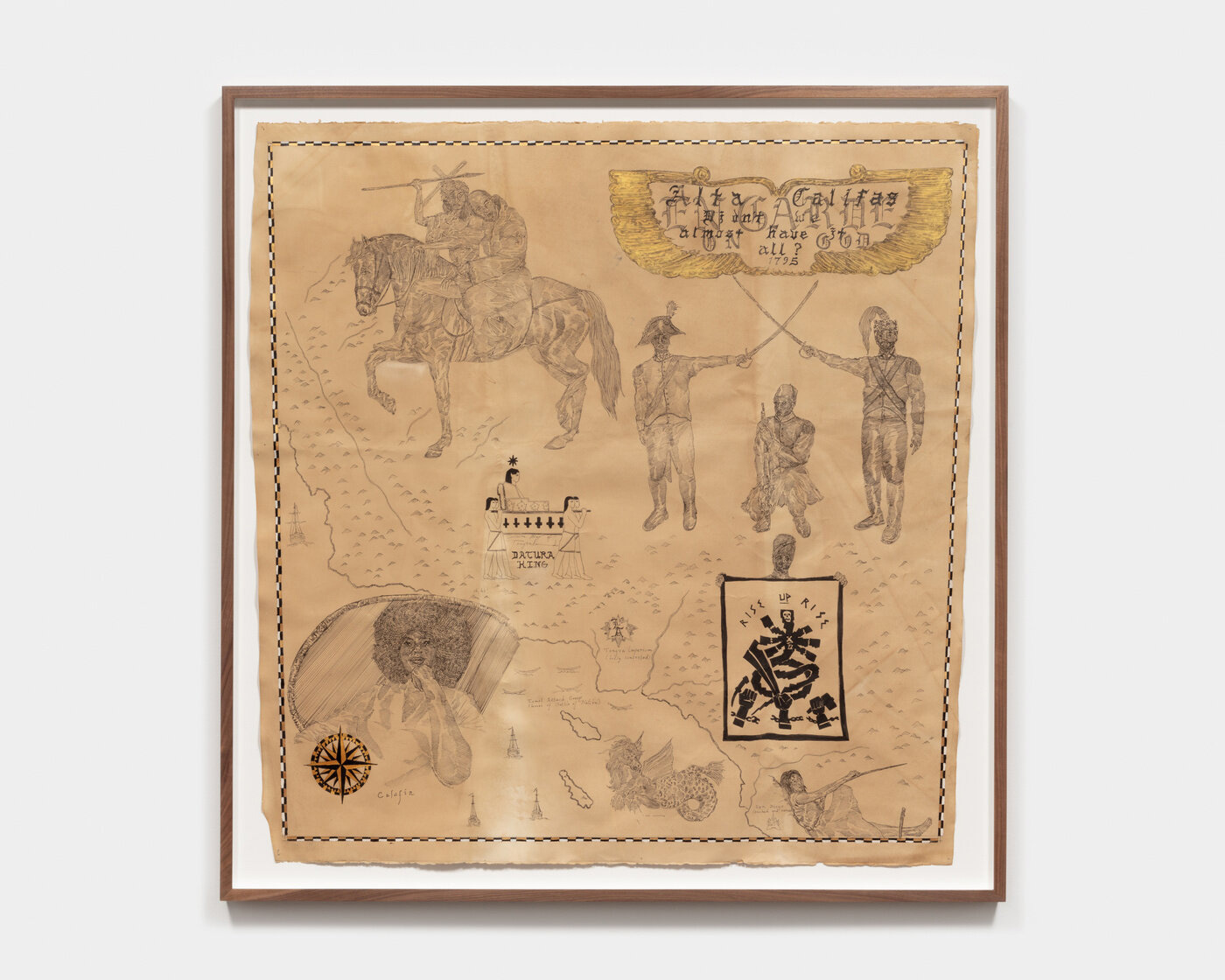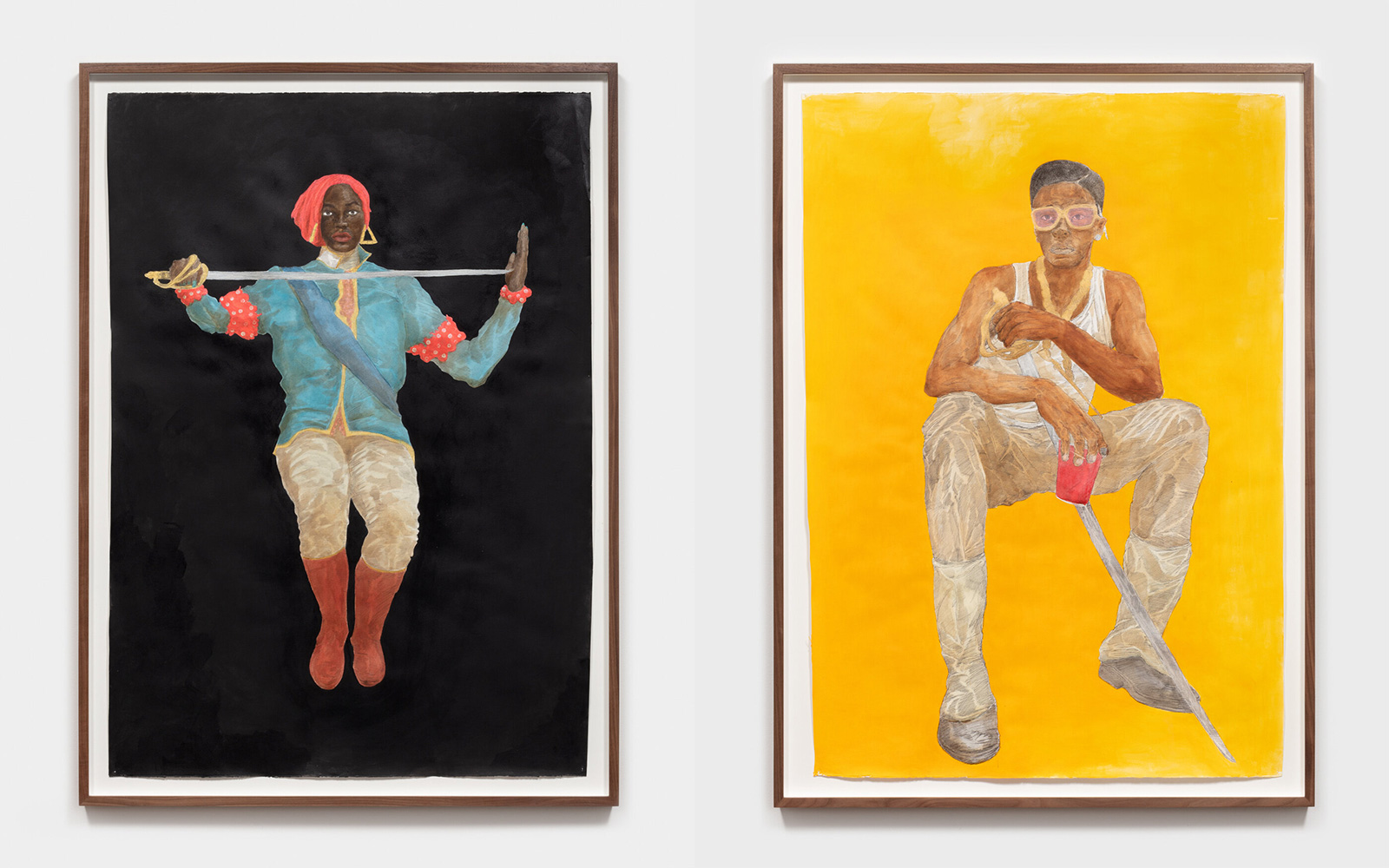PRESENTATION: Umar Rashid-En Garde/On God
 Umar Rashid (also known as Frohawk Two Feathers) is a natural storyteller. He employs writing, illustration, painting, and sculpture to construct fabulations or, put simply, alternative historical narratives that reference a panoply of cultures, collapsing geography and time. At the core of his practice is a reimagining of romantic history painting and eighteenth-century colonial scenes.
Umar Rashid (also known as Frohawk Two Feathers) is a natural storyteller. He employs writing, illustration, painting, and sculpture to construct fabulations or, put simply, alternative historical narratives that reference a panoply of cultures, collapsing geography and time. At the core of his practice is a reimagining of romantic history painting and eighteenth-century colonial scenes.
By Efi Michalarou
Photo: Blum & Poe Archive
Through writing, illustration, painting, and sculpture, Umar Rashid creates alternative historical narratives, including a what-if story about France and England unifying into a gargantuan empire—that reference a panoply of cultures and collapse geography and time while underlining the intricacies of race, gender, class, and overall power in the colonial world. Rashid steers clear of simplistic dichotomies and instead challenges the viewer to consider the complex feelings and conducts that make up every human. In his tales people are as likely to be heroes as villains no matter their color, which ultimately acknowledges their agency as historical actors. In his solo exhibition :En Garde / On God”, with new paintings, drawings, and sculptural work, Umar Rashid presents a new chapter in his fifteen-year-long project of documenting the fictitious history of the Frenglish Empire (1648-1880). Informed by the storylines that are encoded into the canonical narratives of empires and their colonies, and even more so by those that are marginalized and omitted from the historical record, Rashid conjures a world replete with complex iconographic languages that use classifying systems, maps, and cosmological diagrams. Channeling the visual lexicons of hip hop, ancient and modern pop culture, gang and prison life, and revolutionary movements throughout time, in these works Rashid seeks to underline the roles of race, gender, class, and power in the problematic history of recounting history. Before it was the thirty-first state in the union, California was an independent republic for less than a month; it had been two provinces of the First Mexican Empire, once independence stripped it of its former name of New Spain. In Alta and Baja California, provinces the size of a continent, European power resided in a network of Jesuit missions that doubled as military forts, sites of temporal and secular oppression all in one: so many names of saints strung on maps like the beads of a rosary. Before the monks raised their crosses, conquistadores had drawn the path and, again, always given names. Faced for the first time with the gigantic region, they glued the territory to a dream map: Montalvo’s sixteenth-century bestseller,” The Adventures of Esplandían,” depicts the island of California, populated only by strong Black women, tamers of bloodthirsty griffons, and ruled by Queen Calafia. The heathen Amazons hear of Europe’s religious wars and see a chance for the world to learn of their courage, but the California girls, their griffons, and their queen are subsumed into European storytelling. Calafia marries a knight and comes back to California. Game over, says the narrator: “We decline to say more about what became of them because, if we wished to do so, it would be a never-ending story.” There must be a beginning and an end; borders in place and time—however arbitrary—that reinforce fables of uniqueness and hide how much of history is made of the same mistakes. The Frenglish Empire, whose history Rashid’s works chronicle in every corner of the known world, may have never actually existed; yet you will recognize the missions, the warring factions, snippets of colonies and empires reshaped as global tides of war and trade meet numberless individual trajectories. You will hear familiar accents in its tales of heroism and petty opportunism; in its portraits of heroes and villains—bloodthirsty, gold-hungry colonizers and the religious officials who absolve them; former imperial soldiers finding in alliances with indigenous rebels the true meaning of freedom; peasant women forced into lives of vengeance and violence; hapless rulers killed in their sleep and the nameless masses who cheer the deed. The artifacts, the battle-worn flags, the ancient maps: the remains of days that, though they never were, will make you wonder how much you actually know about those that have been. And why.
Photo: Umar Rashid, Eat Shit and die. A prison for the grossly unjust, forced into a perpetual cycle of death and rebirth. A rare Frenglish punishment. Picture the sun god rolling., 2021, Wood, machinery, and gold paint, 36 x 73 x 24 inches, Photo: Josh Schaedel, © Umar Rashid, Courtesy the artist and Blum & Poe Gallery
Info: Blum & Poe Gallery, 2727 S. La Cienega Boulevard, Los Angeles, CA, USA, Duration: 6/11-18/12/2021, Days & Hours: Tue-Sat 10:00-18:00 by appointment only (book here), https://blumandpoe.com

Right: Umar Rashid, A young Griselda on her way to becoming an older, wiser, and infinitely more powerful Griselda, crouching in anticipation of a come up or a let down., 2021, Ink and acrylic on paper, 55 3/8 x 40 1/4 x 2 inches framed, Photo: Josh Schaedel, © Umar Rashid, Courtesy the artist and Blum & Poe Gallery


Right: Umar Rashid, Toine, the Lord of Baltimore (in California), crouched with his fancy, rose-colored lenses and his gaiters on, ready for someone to say something foolish., 2021, Ink and acrylic on paper, 55 3/8 x 40 1/4 x 2 inches framed, Photo: Josh Schaedel, © Umar Rashid, Courtesy the artist and Blum & Poe Gallery

